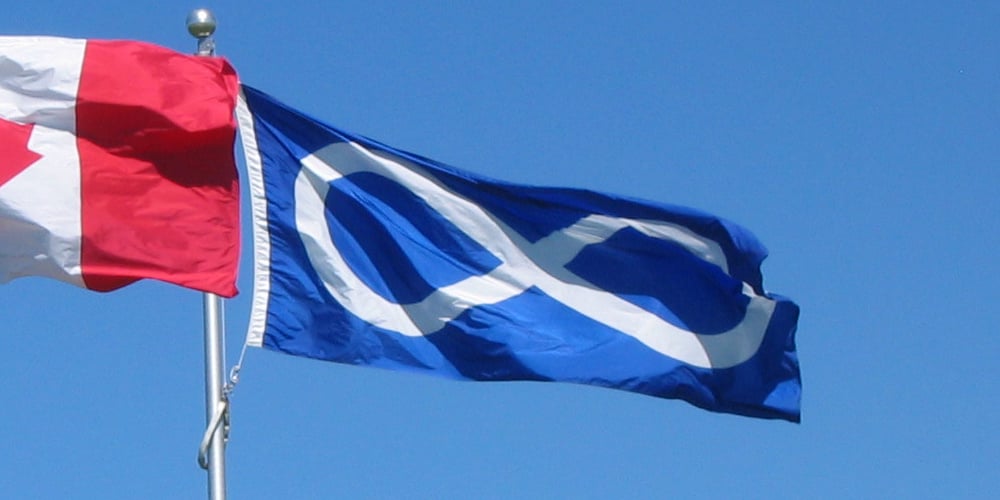Harry Daniels: The Man Who Put Métis in the Constitution
Harry Daniels will share with Louis Riel the honor of having introduced the rights of the Métis people in the Constitution of Canada: Riel in s. 31...

There are a lot of questions and some confusion out there about the April 14, 2016, Supreme Court of Canada ruling on Daniels v. Canada (Indian Affairs and Northern Development) (Daniels) and I’ve received quite a number of “what does this mean?” emails so figured a blog post on the topic would be timely. What follows are some notable legal perspectives from Indigenous law legal experts along with my not legal comments.
The ruling in the Daniels case, in a nutshell, says that Métis and non-status Indians are “Indians” under section 91(24) of the Constitution Act, 1867, which means they now fall under the federal government’s jurisdiction. No longer are Métis and non-status Indians high-centred in identity limbo.
To start off, we turned to three legal experts we respect for some insight into six common questions about the impact on Métis and non-Status Indians and Canada. We provide links to their full perspectives at the end of the article.
If Métis and non-status Indian people fall under s. 91(24), does Canada have a fiduciary duty towards them?
...existing case law from the Court establishes that Aboriginal peoples have a fiduciary relationship with the Crown.
Claire Trusdale, JFK Law
If Métis and non-status Indian people fall under s. 91(24), does Canada have a duty to negotiate with them?
...the SCC noted that it had previously recognized a “context-specific duty to negotiate when Aboriginal rights are engaged.” That is a restatement of what has been consistently characterized as a duty to consult, and where appropriate, accommodate Aboriginal Peoples in respect of their asserted or existing rights. While in practical terms consultation often involves some negotiation, that has not been the legal requirement to date.
Roy Millen and Malcolm Funt, Blakes Aboriginal Law Update
What does this ruling mean in terms of consultation with non-status Indians?
Finally, apart from the brief reference to negotiation in the context of the third declaration sought by the plaintiffs (but not granted), the SCC declined to address the extent to which non-status Indians are entitled to be consulted regarding proposed resource development. This topic, which is potentially significant to project proponents, investors and other third parties, may be the subject of future legislative and judicial consideration.
Roy Millen and Malcolm Funt, Blakes Aboriginal Law Update
Is it a ruling on the relationship between Canada and Indigenous People?
Judith Sayers, First Nations in BC Knowledge Network
- 91(24) has another constitutional purpose as it is about the relationship between Canada and aboriginal people. The community acceptance part of the definition is not needed to determine who falls within s. 91(24) but only as it applies to determining community held rights.
How will this case affect programs and services for Métis and non-status Indians?
The decision does not require the federal government to provide programs and services to Métis and non-status Indians, but it can no longer deny these services on the basis it has no jurisdiction. Métis and non-status Indians now know which level of government to lobby for change and the federal government will have to justify any distinction in the type and level of services it provides to status Indians, non-status Indians and Métis.
Claire Trusdale, JFK Law
Does the ruling address where the federal government will find the funds for Métis people?
What will be interesting is to see how the federal government will set aside money for Metis people, will they just take money away from First Nations? Or will they set up an entirely new budget? How will money be allocated when most Metis don’t have a land base except on settlements established under provincial law. Will they provide housing in urban settings? Schools in urban settings? A different health regime? All those questions will need to be answered.
Judith Sayers, First Nations in BC Knowledge Network
So is the change good and when will it happen?
This case definitely is a game-changer for Métis people and non-status Indians as they, and their interests, will over time become embedded in the policy and law of the country.
As for when it will happen I think you only need to look at other Indigenous Peoples issues and the length of time needed for the needle to move on them. Consider the Tsilhqot'in decision - it came down in 2014 and there has been low to no visible change in the treaty process and policy. What about the associated, big-picture policies that will need to be developed regarding hot-button items such as whether they pay tax on income earned on reserve and how will they deal with housing when most of the people affected by this decision live off-reserve, to name just two. The federal government already has quite a few high-priority portfolios on the go, and probably not enough funding to address them, and this one has only just entered the queue.
Here's some clarification on the definition of non-status Indian and here's some information on status-Indian eligibility.
[1] Metis are a Federal Responsibility - No longer a Jurisdictional Wasteland, First Nations in BC Knowledge Network, Judith Sayers, April 14, 2016
[2] Métis, Non-Status Indians Constitutionally Deemed “Indians”, Subject to Federal Jurisdiction Blakes Aboriginal Law Update, Roy Millen and Malcolm Funt, April 15, 2016
[3] Supreme Court of Canada Releases Daniels Decision, JFK Law, Claire Trusdale in Court Review, Of Interest, April 14th, 2016
Featured photo: Supreme Court of Canada. Photo: detsang, Flickr

Harry Daniels will share with Louis Riel the honor of having introduced the rights of the Métis people in the Constitution of Canada: Riel in s. 31...

In 1982, the Government of Canada patriated the Canadian Constitution, and in so doing, formally entrenched Aboriginal and treaty rights in the...